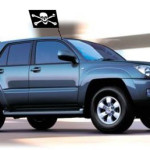BBC News carries an interview with a 25 year old Somali pirate
Years ago we used to fish a lot, enough for us to eat and sell in the markets…. Then illegal fishing and dumping of toxic wastes by foreign fishing vessels affected our livelihood, depleting the fish stocks. I had no other choice but to join my colleagues…
Almost too perfect. Not your typical pirate talk (aarggh…depleted fish stocks and harr….join my colleagues). I wonder who’s translating here? The language is reminiscent of development-speak from the World Bank. Yet, you might say the sentiments are common to all men …
Now I have two lorries, a luxury car and have started my own business in my town…. I only want one more chance in piracy to increase my cash assets, then I will get married and give up.






More pirate stories!
I’m glad this is picking up speed (illegal fishing and toxic waste dumping) and not only the Maersk Alabama incident.
The cry against illegal fishing I get and can totally undestand this what happens when people are driven to desperation…sadly the latter is sounds like the all-too-common ‘thirst for gold that cannot be quenched’. I guess we can only hope that the long term picture does result in a better quality of life, not just more robber barons……
Illegal fishing (and toxic waste dumping) is not done by the local populace but foreign fleets who take advantage of no government that would assert its jurisdiction.
The Somalian pirate issue is being framed as an environmental justice case, i.e. a cry for help. The analogy is a large industrial operation polluting in poor neighborhoods because desperation is high and political resistance is low. I have seen this argument applied to the Somalian pirate case by BBC in the past, and from what else I’m reading, it seems to make sense.
From what I can gather, the piracy started out as a response to illegal fishing (and possibly dumping) but has grown into a fully fledged business.